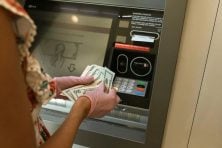This Bible App Creator Earns $6,000 a Month — And He’s An Atheist

When Trevor McKendrick first came up with the idea to develop an app in 2012, he wasn’t sure what, exactly, he wanted to create. His big goal was to build a product that would meet customer demand, while making some money on the side.
He had no idea how successful his app would become: McKendrick’s app has earned him $170,000 and counting.
The even crazier part? He built his app off an idea he doesn’t even believe in: God.
McKendrick recently shared his startup story with Alex Blumberg on Blumberg’s StartUp podcast in an episode entitled “Know Your Consumer.” Here’s how McKendrick chose his target market and launched his app, plus his advice on how to discover your own profitable niche for an app.
The Quest for Passive Income
McKendrick, who had previously worked as an auditor and was working two part-time jobs as an accountant and business analyst for the state of Utah at the time he launched the app, was hoping to create a passive income stream of about $600 a month to cover his rent, he told Blumberg. He scoured lists of popular apps, looking for high-ranking and profitable apps that left room for improvement. When he found high-ranking Spanish language Bible apps and saw ways he could build a better version, he went to work.
Using his Spanish language and tech skills, McKendrick, 29, found a Romanian programmer to help with the project, created an app, and put it up for sale on Apple’s App Store. Building the app cost approximately $500, and McKendrick was hoping to earn his investment back within a month or so.
He launched the product on a Sunday, he wrote on his blog. On day one, he made $36.35. The first month, his sales totaled nearly $1,500 — far more than his initial goal of $600 in “rent money.” However, his profits wouldn’t stop there.
He contracted with an audio studio to record the Spanish language Bible as an audiobook, and released it several months later. His revenue jumped almost fourfold overnight to $6,000 a month — 10 times what he had initially hoped to make.
McKendrick earned more than $73,000 in his app’s first year, and year two earned him $100,134. Managing the app requires little overhead, and McKendrick estimates he spends an hour a month on the app, at the most. “It doesn’t feel like real money because so little work is involved,” he told Blumberg.
He admits his early versions weren’t perfect, but he said they were better than the competition at the time, and that was all that mattered: meeting customer demand. He was working to test the market without spending too much cash in the process.
When he started making more money, he reinvested it by improving the app: making it more aesthetically appealing, adding new functionality and making it easier to use. He’s even attending Spanish Christian publishing conferences to make connections and incorporate more content into the app.
The Twist
When you think of who would be most likely to create a Spanish language Bible app, who would you imagine? A preacher? A religious scholar? An evangelical believer?
McKendrick is — you’d never guess — an atheist.
Despite the ease of income and his windfall from the project, McKendrick feels guilty and conflicted at times making his living peddling Christianity while he himself is not a believer. “My wife introduces me to her friends as a Bible salesman,” he told Blumberg. “It’s a joke because we don’t believe in Christianity, we don’t believe in the Bible.”
Creating an app promoting a religion he doesn’t subscribe to weighs heavily on him, especially when he receives prayer requests from app users. Many users assume he is a religious leader and seek him out for help interpreting Bible verses or praying for family members with serious illnesses.
“If I knew how big it was going to be, I don’t know if I would have gotten into it,” he told Blumberg.
“Now, with this amount of money, there’s some sort of moral obligation I feel like I have. It’s just uncomfortable, selling something that I don’t actually believe in.
Originally, when it was this little punk app, it was like no big deal. Who cares if I make $600 selling the Bible? But now it’s six figures and it’s like, should you be doing that? I don’t know — should I?”
While he has no plans to stop selling his app anytime soon, he has used some of the profits to develop a new project more in line with his values: a virtual assistant company.
Advice for Aspiring App Developers
Interested in creating an app of your own? McKendrick’s blog is full of advice for people hoping to replicate his success.
He shares ideas for how to find and target a profitable niche, where your app is most likely to be successful. If you don’t have the technical chops to build an app, you’ll need to learn how to contract with a developer. McKendrick also offers tips for attending conferences to network with those who might help you market and promote your app.
Building and promoting an app isn’t the easiest way to make money, but it can be a successful option. Though, as McKendrick’s situation demonstrates, you might want to choose a niche or market that matches your beliefs.
Your Turn: Would you try building an app and targeting a specific niche? What do you think contributed to McKendrick’s success?
Kristen Pope is a freelance writer and editor in Jackson Hole, Wyoming.












